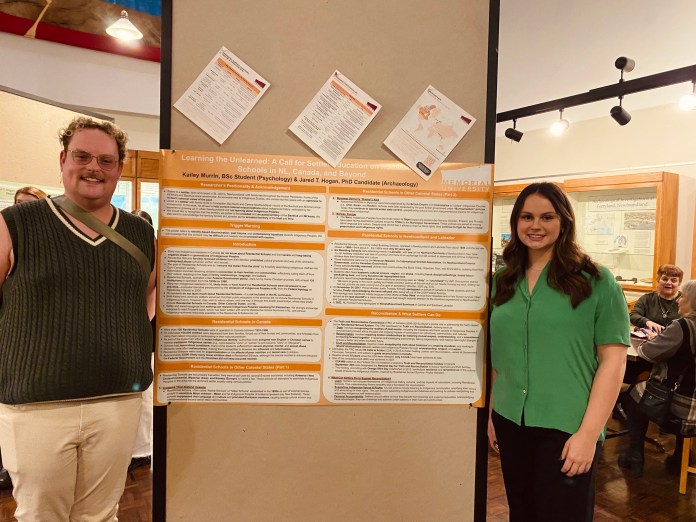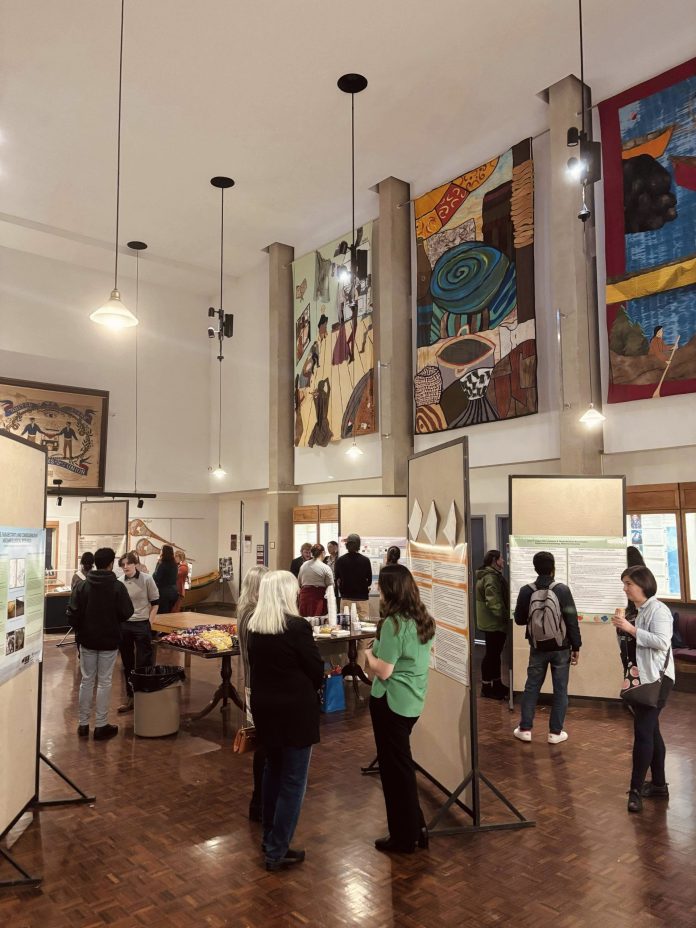Presenting research can be a nerve-wracking experience, one dozens of students overcame at Cultural Explorations: An Interdisciplinary Symposium on Humanity 2024, sharing their work with peers, faculty, and the wider community.
The student-led symposium brought together 39 presenters from 16 academic units on November 26, presenting on topics including bioarchaeology, food studies, Indigenous history and gender and sexuality.
The event focused on building confidence, fostering mentorship, and making academic work more accessible.
Stepping into the Spotlight
Evelyn Munroe, a first-year MA (Archaeology) student, admitted that presenting at an academic conference was initially intimidating. “I was trying to navigate how I should act and what was expected of me,” she said.
“As the evening went on and I talked to other people I got more comfortable. The conference definitely gave me a better understanding of what a formal presentation is like, and I feel much more confident for my next one.”
The symposium was designed to create a welcoming, low-pressure environment, encouraging students to share their research without the formality of larger academic conferences.
Noah Williams, a phase 1 (medicine) student, said the event helped him see his research in a new light and build connections with healthcare managers.
“The overall goal of presenting my research at this symposium was to spread awareness of some of the costs that patients incur to access emergency care in Canada,” he said.
Williams said that through Cultural Explorations, he connected with nurse and healthcare manager Rayleen Hogan, exemplifying the value of engaging with the local community.
He goes on to emphasize the value of engaging with the local community and healthcare professionals at the event.
“Connecting with members of the community attending the symposium and hearing about their emergency department experiences highlighted the impact of long wait times,” said Williams.
“As a future Medical Doctor, using my knowledge of Clinical Epidemiology gained through my master’s degree and discussions with others such as Rayleen, I can be more aware of and hope to address some of these systemic issues affecting Newfoundlanders and Labradorians in my future practice.”
Mentorship and Collaboration

One of the standout aspects of Cultural Explorations 2024 was its focus on mentorship. Undergraduate students had the opportunity to present alongside graduate students, making the event unique in its inclusivity.
Jared T. Hogan, a PhD candidate in archaeology and co-chairs of the event, emphasized the importance of creating a space where students at all levels feel comfortable sharing their work.
“So many undergraduate students are interested in research and exploring topics outside the classroom, but they don’t always know where to turn to do that. This symposium gave them the opportunity to complete research,” he said.
Even younger participants got involved—a junior high student interested in anthropology and criminology attended and took part in discussions, proving that curiosity and engagement can start early.
A Community Gathering, Not Just a Conference
Beyond the academic presentations, Cultural Explorations 2024 had a relaxed, welcoming atmosphere. “It was great to see so many different people in the audience—other students, professors, even my parents, grandparents, and brother. It made the experience feel more meaningful,” said psychology undergraduate student Kailey Murrin.
Meghan Fillier, a second-year MA (Sociology) student, said having her family present was a beautiful experience. “They’ve heard me talk about my research for so long, but this was the first time they got to see it in action. Watching them engage with my work and be proud of what I’ve accomplished made the whole experience even more special,” she said.
With casual networking opportunities, a lively poster session, and engaging discussions, attendees left with new ideas and connections. For students considering presenting their research in the future, participants had some advice.
“My biggest advice for first-time presenters is to embrace questions and feedback—they push your thinking in new directions and help you grow. Most importantly, keep in mind that everyone is a learner and everyone is a teacher; value the knowledge you possess, but also be humble and continue learning,” said Tienne Mouland, a recent Archaeology MA graduate.
Events like Cultural Explorations 2024 show that research doesn’t have to stay in the classroom or laboratory—it can be shared, discussed, and celebrated in a way that’s approachable and engaging.
